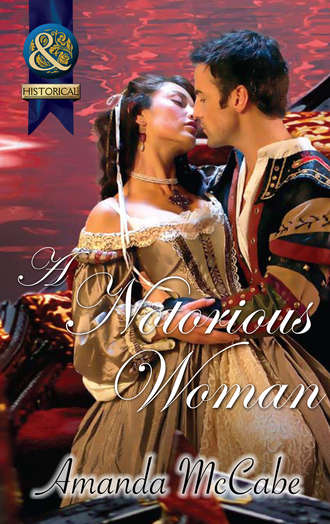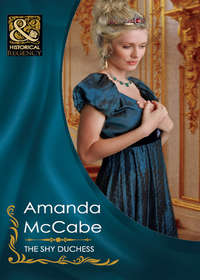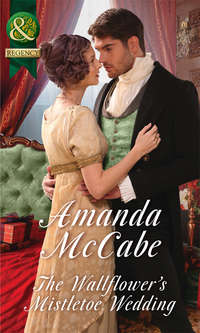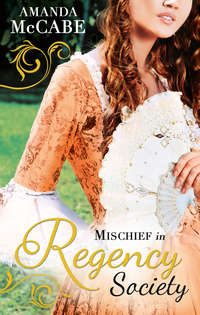
Полная версия
A Notorious Woman
Shrugging the heavy braid of her hair back from her shoulder, Julietta reached out to push open the window. She closed her eyes as the cold night air washed over her face and throat, along the curve of her breasts bared by the low neck of the chemise and, for one moment, she imagined it was his hand on her skin. His callused sailor’s touch sliding roughly over her shoulder, tracing a crooked line of fire lower, ever lower, his breath cool and sweet, making her shiver in sweet anticipation…
Madre de dio! Julietta’s eyes flew open, and she found herself alone, staring down at the emptiness of the campi. From a distance, echoing, she heard laughter and music from some merry gathering, but no turquoise-eyed sorcerer watched her. No caresses reached out for her.
Dangerous, indeed. Once, long ago, when she was young and foolish, she had thought her husband handsome and charming, had fancied herself in love with him like a maiden and a knight in a poem. She had craved his kisses, worshipped his voice and touch and glance. That had shattered in an unfathomable rush of hellish violence that killed the girl she had been for ever.
After Giovanni died and she came to start a new life in Venice, Julietta took a couple of lovers, gentle, unassuming, discreet men whose kisses were pleasant and sweet, but did not move her to the dizzying heights she felt when first with Giovanni. Neither did they ever cast her into black despair.
Marc Antonio Velazquez could do that. She sensed it, knew it. There was something hidden about him, concealed behind his good looks and fine clothes, his polished manners. Only one cloaked soul could recognise another. He was a complication she did not need. Her life was good now. Settled. Safe.
As safe as she could ever make it.
Men such as Il leone had no place in her world. She had to make sure of that.
Julietta shut the window and latched it before taking up her dressing gown. As she slipped it over her chemise, she left her chamber on careful, silent feet. Bianca snored softly on her truckle bed in the corridor, but Julietta just crept past her, down the narrow stairs to the darkened shop. The shutters were drawn tightly over the windows, the door solidly locked and barred; no one could possibly be spying on her here. Still, she glanced carefully over every inch of the room, every vial and jar, before creeping over to the hidden panel set in the wall.
Her fingertips quickly found the tiny knot of wood and pressed hard. The panels slid apart to form a fissure just large enough for her to move through. She lit a branch of candles before shutting the secret door behind her again, closing herself into her own private world.
There were no windows or skylights in her hideyhole; the only light came from the soft flicker of the candles. It was a small chamber, yet held all she could need. Long, narrow tables were pushed against two of the walls, laden with scales, beakers, silver bowls, a mortar and pestle and a variety of spoons and knives. The other two walls held shelves piled with books: ancient volumes she had painstakingly and at great expense collected over the past three years or had inherited from her mother and grandmother. There were also several covered baskets and pottery bowls, rows of stoppered bottles. Suspended from the dark wood rafters were bunches of dried herbs along with other, stranger materials. Ones she would never want the patrons of the perfumery just beyond the wall to see.
Never.
Julietta quickly went to work, for the night was half gone already. She spread out her materials—a beaker filled with clear liquid, small scissors, the mortar and pestle—and lit a small bowl of oil. Narrowing her eyes, she gazed up at the herbs, gauging which ones suited her purposes tonight. Angelica, yes; nettle, rue, and marjoram—all of them held great powers of protection and wisdom. Using the little silver scissors, she snipped a sprig from each and put them in the silver bowl.
Her herbs gathered, she knelt beside the table, hands tightly clasped and eyes shut. “Oh, Great One,” she whispered. “I pray that the mysteries will be revealed to me this night, and my place in the world restored. Help me to see the truth. Guide me in my actions. Protect me.”
And help me to divine what this Signor Velazquez seeks here in Venice, she added silently.
“Amen.” Julietta crossed herself, and stood up to reach for the herbs she had chosen, the mortar and pestle. These hours, deep in the secret cloak of night, belonged only to her, to the lessons she had learned so long ago from her poor mother, from her grandmother. They had to belong only to her—or they could mean her very death.
Yet somehow, despite the dangers she knew all too well, she was compelled to this. Compelled to use her knowledge to help other women whenever possible. Women like Cosima Landucci—women like herself. Not even the threat of the stake could stop that.
And not even a sorcerer’s turquoise eyes could turn her purpose. It was set—and done.
Chapter Five
“Madonna!”
Bianca’s voice, echoing amid the crates and boxes of the store-room, startled Julietta, nearly causing her to bash her head on the case she was unpacking. As it was, she stumbled backwards, a jar of oil clutched in each hand. She had been counting the new arrivals, completing the shop’s inventory, but really, her thoughts were far away, drifting inexorably to the experiment that bubbled and fermented quietly in the secret room.
And trying not to drift to Il leone.
“Yes, Bianca, what is it?” she said, placing the jars carefully back into the padded case. “Do you need my help in the shop?”
Bianca closed the door behind her and leaned back against it, covering her mouth with her handkerchief amid a flood of giggles. “He is here.”
Julietta knew immediately the he that Bianca meant. She turned away from the maid to hide her suddenly warm cheeks, busying her hands with tidying the inventory ledgers on the floor beside her. She had to compose herself, to stop this absurdity immediately, or she would soon find herself giggling away, just like her silly maidservant!
This was business. That was all.
“Signor Velazquez?” she said.
“Sì. And looking even more lovely than before.”
“Well, then, Bianca, the perfume he ordered is behind the counter, in the purple glass bottle. You can package it up for the ‘lovely’ gentleman.” Yes, that was it—send the man on his way without even seeing him.
But life could never be so simple. “Oh, no, madonna. He is asking to see you especially.”
Asking to see her, was he? Why should that be? If she had time to puzzle it over now she would, but that would have to wait for later, when he was gone and she was alone in her room. Right now, though, she had a business to run, and he was a very important customer.
An important customer who wished to see her. Especially.
Julietta pushed herself to her feet, removing her apron and brushing the dust of the store-room from her black skirts. A strange, cold apprehension fluttered in her stomach, but she ignored it and strode past Bianca, opening the door to the shop. Bianca slammed the door back into place as soon as Julietta was past her, leaving her alone in the shop.
Or rather, not quite alone.
They had been busy in the morning; so many people wanted their new scents for Carnival, and customers had crowded the shop to claim their purchases and hear the latest gossip of the Landucci death and the doings of Il leone. Now there was an early afternoon lull, and Marc Antonio Velazquez was the only person in the room.
He was half turned away from her, examining a display of the new French oil burners, which gave her a moment to examine him. She had begun to think that surely her mind had exaggerated his charms, painted him as taller than he was, stronger, darker, a figure of poetic fantasy. But, no—he was everything she remembered. He wore green today, dark forest-green velvet as subtle and rich as his red garb of two days ago, trimmed only with silver-edged slashings on the sleeves and a pale silver fox lining to his short cloak. He held his green velvet cap in one hand, turning it lazily in his long fingers, and the fall of his glossy dark hair gleamed in the sunlight.
The pearl still dangled from his earlobe, emphasising the strong, clean line of his jaw. A small frown creased his brow as he stared at the burners, yet she sensed that he did not see them at all, that his mind was very far away.
Just as hers had been these past two days.
She wondered what he thought of, what dwelled behind the façade of the elegant hero, the brave sea captain all Venice lauded. No, not just wondered— longed to know. Her chest ached with the need, a need she had thought long dead and buried, a need to understand another human, to know she was not alone.
Yet why should that be, with this man, this stranger? For that was all he was, a stranger she had glimpsed only briefly and now fancied such dramas over. She was surely blinded by his beauty, as every woman in Venice was these days. She heard little else in her shop except the doings of Il leone, the ladies he danced with at balls, the honours the Doge showered on him. Julietta would have thought herself sick of him—if she had not so eagerly listened to every scrap of gossip.
Yes, that was all it was, a fantasy, built of sleepless nights and the growing excitement of Carnival. He was merely a man, as any other.
“Buona sera, signor,” she said, stepping out of the shadows. “Welcome back to our shop.”
He spun towards her, his thoughtful frown lightening into the charming smile she remembered. His eyes seemed somehow darker today, blue-green as deep seawater, not as turquoise. He took her hand in his and raised it to his lips for a quick salute. Quick—yet not unaffecting. Gentlemen usually merely brushed the air above a lady’s knuckles, yet he actually touched his mouth to the skin of her fingers, soft as a cloud, warm as summer. His breath, sharply indrawn, swept across her wrist, then he released her, stepping away with a suddenly solemn expression etched on his face.
Julietta stepped away, startled. “I—your perfume is ready, signor. I bottled it in purple Murano glass, the colour of violets.” She ducked behind the counter to retrieve the vial, taking a bit longer than was necessary to fetch it in order to find her serene centre again. She had felt something when he touched her hand so intimately. Not merely sexual attraction, though, of course, that was there, but something more. A quick swirl of something dark, hidden and vast.
It had been such a long time since her mother’s gift visited her. Could it be coming back now, of all times and with this man? What could it mean?
Julietta rose from behind the counter, holding the bottle carefully in hands that longed to tremble. She wanted to run from the shop, to flee into the fresh, cold air and keep going until she left Venice altogether and found herself all alone in a country field. Yet she could not. Not yet. Not now.
He moved to the other side of the counter, his head bent to examine the gift. His hair fell forward in a shining curtain, hiding his face from her view for a moment, and she felt so very foolish. Had she not just told herself that he was merely a man? There was surely no magic here, no hidden darkness waiting to suck her down to its depths.
“It is beautiful,” he said quietly.
Julietta turned the glass, the light from the windows catching at its perfect facets. It was beautiful, one of the finest pieces from her favourite Murano glass blower. It was the deepest of purples, set with tiny amethysts and stoppered in gold filigree. A fitting tribute for a hero. “I hope your mother will like it.”
“She will love it, just as she would love all of Venice, if I could but show it to her.”
“The city does, indeed, have many beauties, especially at this time of year,” Julietta said. “The Piazza San Marco, the Doge’s Palace, the glorious bridges…”
“The beautiful women?”
Julietta gave a startled laugh. “Those, too. The ladies of Venice are well known for their beauty and grace.”
His gaze moved from the bottle to her face, watching her steadily with blue-green intensity. “One in particular, I would say. Lovely beyond any other.”
The words were flirtatious, yet no light grin touched his lips. What lady could he mean? Julietta wondered with a sharp pang. “Ah, signor, have you now found a lady to accept your tokens of affection, as you said you had not when we first met?”
“Not yet,” he answered, leaning against the counter with a smooth, catlike grace. She saw so clearly where he had earned his pseudonym. He was like a lion, indeed, sleek, beautiful, dangerous. “But soon, I hope.”
“If you seek gifts for her…”
“I would, if I knew how to best please her.” In one quick, gentle movement he caught her hand in his, running the rough pad of his thumb over the simple silver ring she wore. “She does not appear to care for jewels.” His gaze slid over the plain black cloak hung on a hook by the store-room door. “Or rich furs.”
Her? He meant to impress her? When every woman in the city vied to strew flowers beneath his feet, join him in his bed? Julietta nearly laughed with disbelief, but his gaze remained steady, serious, never wavering from her face.
What was happening here? Surely she was no gullible girl to believe he desired her, no matter what guilty, secret hopes lurked deep in her heart. She remembered that brief swirl of darkness she had felt when he touched her hand. Something was happening between them, something she wanted so desperately to explain, to know.
Julietta drew her hand from beneath his, but leaned closer, until she could smell the clean ocean scent of him. “Carnival is a special time. Some say it is even—magic,” she whispered. “Masks can set people free, can make them see the truth behind the disguises we all bear. Desire can come to reality then. Perhaps you will find what you seek in the nights of secrets, signor. Perhaps you can find what you always wanted.”
They stared at each other in charged silence, not touching, yet close, so very close. Julietta did not know where her words came from. Her mother had always said that Julietta held herself inside too much, always thinking, planning. Sometimes, my daughter, she had told her, you must simply say what is in your heart.
Easier said than done, of course. And look where speaking her heart had got Julietta’s mother. Yet Julietta knew that what she said was true. Carnival was a time out of time, a time when the truths of her life—the hidden room, Count Ermano, her past in Milan, everything—could vanish for a night. Behind a mask, anything was possible.
“Do you verily speak truth, madonna?” Marc said roughly.
Julietta nodded. Follow what is in your heart, a voice whispered in her mind.
“Then will you do me the honour of accompanying me to a ball in the Piazza San Marco tomorrow night, after the Marriage of the Sea?” He watched her very closely, his gaze unreadable.
Your heart! “Yes, signor. I will go with you to the ball.”
Chapter Six
The crowds were thick on the fondamento along the Grand Canal, a living, pulsing mass of flesh, breath, velvet and linen, jewels, masks. The scents of perfumes and people blended with the strange, sick sweetness that always seemed to rise from the canals, twisting, twining with the sounds of laughter and chatter and music to form a golden net that hung heavy over all of Venice. It was the day of the Feast of the Ascension, the day the ancient ritual called the Marriage of the Sea would be enacted. No one wanted to miss that.
Not even Julietta. She pushed her way through a knot of people, using her unusual height to advantage in seeking a fine spot to view the procession before it moved into the lagoon and out of sight. Bianca followed closely behind, clutching at Julietta’s sleeve so they would not be separated in the crush. At last they found a few empty inches at the edge of the canal, where they could watch and observe.
Julietta reached out to wrap her hand around a striped pole that would usually tether a gondola, but could today hold her in place, firm against the surgings of the crowd at her back and pressing on both sides. To her left stood a courtesan, henna-haired and perfectly rounded in her silver-spangled crimson gown, surrounded by a throng of admirers. The heavy perfumes of gardenia and bergamot rose from them, along with a copious amount of pungent wine. At Julietta’s other side stood a young couple and their two small children, obviously artisans to judge by their simple garments and their scent of plain soap. All manner of people, rich, peasant, old, young, nun, courtesan, mingled on this day, as they would until Carnival exploded to a close and sent them all scurrying back to their own worlds again.
Julietta gave the two excited children a small smile and turned her attention to the wide canal before her. The Doge had not yet appeared, but there was no lack of spectacle even so. Barges and gondolas lined the inky water, black and gold and white, sparkling like an emperor’s jewel case in the sun. Each craft was decorated with copious amounts of flowers and brightly coloured ribbon streamers. Music played from a few of the larger vessels, lively dance tunes from lutes and viols, mingling with all the laughter.
It had been many years since Julietta came to Venice; many times she had seen this pageant play out. Yet somehow it always awakened something deep inside her, her own laughter, her own mirth. It tumbled around in her heart like some unruly butterfly, reminding her of days when she was a young, carefree girl and longed for nothing so much as a fine festival, a dance, a song of courtly love. She never gave in to that wildness now, but it was still hidden there.
And she did like this day, the bright hope of it, the life that filled every corner, driving out death and decay even if only for a moment. Part of her high mood, she had to admit, had something to do with the thought of the evening to come, when she would see him again—Il leone, Marc Antonio Velazquez, whatever he wanted to call himself. She would see him, dance with him, and it filled her with an odd warmth she had no desire to analyse. It was dangerous, she knew that. He was a man of many secrets. Yet today she found it hard to take care, as she always should.
Thanatos was hidden by the crowd, the sunlight. Only Eros remained, full of mischievous romance. Or perhaps Dionysus, she thought, as she watched one of the courtesan’s young swains reel drunkenly, saved from toppling into the canal when one of his friends grabbed on to his fine satin doublet and hauled him back on to terra firma. The woman and her admirers fell into great peals of merriment, leaning against each other, passing around a bottle that was sure to cause more such scenes as the day went on.
“Signora Bassano! Such a rare pleasure.”
Julietta’s smile faded, wiped away as if it had never been as she heard those words. A smooth, charming, elegantly accented voice, hailing her from the water just below her perch, dimming the brilliant day. She could have vowed that a gray cloud eclipsed the sun, but when she glanced up at the sky it was as cerulean and flawless as before.
She tightened her grip on the wooden pole and stared down at the canal, feeling Bianca press closer to her side. Count Ermano Grattiano—just as she feared. His grand gondola, glossy black edged with copious frostings of glittering giltwork and sprays of black-and-gold plumes, had come to a halt only feet away. The velvet curtains of the felze were drawn back, leaving its occupants revealed to view.
As always, Count Ermano was as gloriously caparisoned as his vehicle, in a doublet of gold satin edged in ermine and gold braid, his hose striped white and gold, his sleeveless coat lined with more of the rare white fur. A diamond the size of an egg winked and dazzled in his cloth-of-gold hat, mocking her with its glitter.
The gem was well matched to its owner, Julietta thought wryly. Though her senior by many years, Count Ermano was still a very handsome man, with thick white hair and a neatly trimmed white beard, cold green eyes bright and shrewd in a lined, chiselled lean face. He had a quick, wide smile, an easy air that belied the power and ruthlessness below the sparkling surface. He had made a great fortune in the Veneto, by means rumoured to be both fair and foul. He held an important position in the Doge’s court, as a member of the Savio ai Cerimoniali, the committee which arranged state visits of foreign rulers, ministers, and ambassadors—the committee that had seen many of its members, including Signor Landucci, die so unfortunately of late. His home, Ca Grattiano, was one of the most glorious in the city. He had been married four times, all of them ladies of impeccable lineage, fortune and beauty, who passed away sadly before their time.
Now, he seemed to want to add Julietta’s small villa and farm on the mainland—the settlement she had received from her husband’s family when she left Milan—to his kingdom. Perhaps he even wanted to add Julietta herself, though she could not fathom why. He had every young, full-bosomed courtesan in the city at his beck and call, he did not need her tall, thin, dark self. Whatever he truly desired, he had been most persistent in seeking it. He came to her shop, sent small gifts, invited her to gatherings at his palace, ever since the day they met in San Marco.
Now he was even interrupting her jovial feast day.
But she had hesitated too long in answering his greetings. The people around her were beginning to stare in puzzlement, obviously wondering why she ignored such a very important man. Even the loud hum of laughter and talk had faded to a low buzz.
Julietta stared directly, boldly down at the count, who watched her with a narrow, patient smile on his finely drawn lips. Beside him, half hidden in the shadows of the felze, was his son, Balthazar, watching the proceedings with a scowl on his narrow, youthful face, arms crossed over his white velvet doublet. Balthazar was the heir to the Grattiano kingdom, Ermano’s only child, yet he always seemed to behave like an unhappy prince, filled with some half-hidden, seething anger. But he was a handsome youth, with fine, high cheekbones, mossy green eyes and dark, silken straight hair falling to his shoulders. There was something odd about him today, something familiar she had never sensed in him before…
“Good day, Count Ermano,” she called, giving a tiny curtsy of acknowledgement.
“Indeed, it is a good day, now that I have seen you, Signora Bassano,” he answered. His words and demeanour were all that was courtly and correct, yet a mocking note lurked in his voice, as it always did. He seemed to sense the disquiet he awakened in her, and revelled in it. “Forgive me for not calling in your shop sooner. I have been visiting my estates on the mainland.”
Ah, so that was it, Julietta thought wryly. And here she had thought her spell of repellence worked. Drat it all. “I trust all is well there.”
“Impeccably so, of course.” The count leaned over the side of the gondola, peering up at her with his bright emerald gaze. “Signora, would you care to join us for the procession? There is more than enough space for you and your maid.”
Julietta’s chest constricted at the thought of being confined with the Grattianos on that suffocatingly luxurious craft, and she clutched at the pole until splinters pressed into her palm. For an instant, darkness pressed in on the edges of her sight, and she wasn’t sure if she was still standing by the canal or caught in a dream-vision. Surely that was no ordinary gondola, propelled by a mortal boatman, but a craft of Charon, waiting to ferry her to the Underworld.









